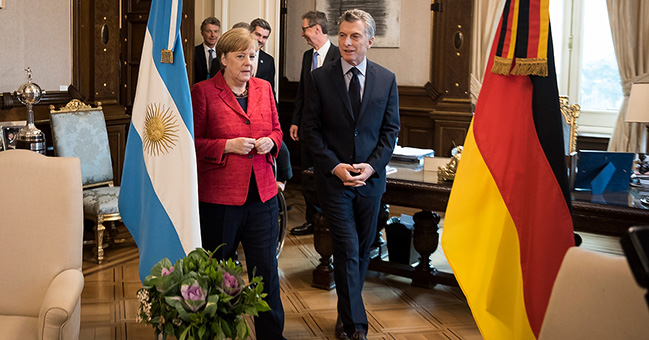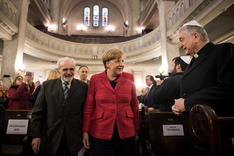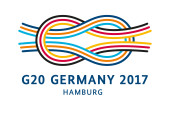Latin America trip
Angela Merkel praises Argentina's openness
Chancellor Angela Merkel has praised Argentina for its "courageous reform path", which she said is making the country economically stronger and more open. She said that she supports its wish to see a free trade agreement concluded soon between the European Union and the states of South America. Today, Angela Merkel will fly on to Mexico.
 President Mauricio Macri received the Chancellor, who was on her first visit to Argentina
Photo: Bundesregierung/Kugler
President Mauricio Macri received the Chancellor, who was on her first visit to Argentina
Photo: Bundesregierung/Kugler
"We are happy that we are partners in a world that believes in rule-based cooperation, and we support Argentina in its reforms." During her visit to Buenos Aires, the Chancellor thus expressed her agreement with President Mauricio Macri on key issues.
As they delivered a joint statement to the press in the Argentinian capital, she praised the country’s "courageous reform path" and pledged that Germany would also support Argentina’s efforts to join the OECD.
Argentina’s climate targets "very ambitious"
Angela Merkel underscored the common ground between the two countries in the field of climate policy. She was impressed that Argentina had set itself "even more ambitious" climate targets within the framework of the Paris Agreement on climate change. There is still much scope for action on expanding Argentina’s energy supply, she said. Germany companies could make a contribution. The field of renewable energy is an area in which Germany has a great deal of experience, said Angela Merkel.
Chancellor in favour of EU trade agreement with "Mercosur" states
Another point on the agenda during her meeting with President Mauricio Macri was economic and trade policy. The WTO Ministerial Conference will take place in Argentina at the end of 2017. "We both reaffirm our commitment to free trade and a multilateral trade system," said the Chancellor.
At the same time, the chance exists to enter into bilateral agreements, for instance between the European Union and the "Mercosur" states. She said she supports Argentina’s wish to see swift progress in this context. "Our experience in Germany and in the EU is that all trade agreements we have entered into with various regions of the world have generated jobs. And thus prosperity for the people – and that is what it is all about," stressed Angela Merkel.
Mercosur (the market of the south) is the common market founded in 1991 by the South American states of Argentina, Brazil, Uruguay and Paraguay. Venezuela’s membership is suspended at present. Bolivia joined Mercosur in 2014, but its accession has not yet been ratified by all member states.
The EU is currently negotiating a free trade agreement with Mercosur. Negotiations have experienced a new momentum since the second half of 2016. The most recent round of negotiations was successfully completed on 24 March 2017.
Extremely close cooperation on the G20 agenda
Angela Merkel also discussed the current German G20 Presidency, which was another reason for her trip to Buenos Aires. Argentina will take over the Presidency next year. China held it last year. Angela Merkel thanked President Mauricio Macri for the "extremely close cooperation" on the G20 agenda. "Argentina is providing very strong support here, and next year we hope we can reciprocate, given the support that we are now receiving". Angela Merkel reiterated that Argentina in particular very much strengthens the G20 motto "Shaping an interconnected world".
Before her meeting with President Macri, Angela Merkel visited the "Templo de Libertad" (Temple of Freedom) synagogue in Buenos Aires.

![]() The Chancellor's itinerary in Argentina included a visit to the "Templo Libertad" synagogue in Buenos Aires
Photo: Bundesregierung/Kugler
The Chancellor's itinerary in Argentina included a visit to the "Templo Libertad" synagogue in Buenos Aires
Photo: Bundesregierung/Kugler
This synagogue is an impressive symbol of Jewish life in the city, declared Angela Merkel. "Many people of the Jewish faith who were forced to flee the crimes of the National Socialists found a new home here." That is why this synagogue is also a "bridge between Argentina and Germany". In the synagogue, the Chancellor officially unveiled an organ which had been damaged in Germany during the National Socialist regime. It has now been restored in Argentina with German funding. Argentina’s Jewish community is the largest in Latin America.
The Chancellor also visited the Parque de la Memoria (Park of Memories) to pay her respects to the victims of Argentina’s military dictatorship (1976-1983). She praised the way the country has since addressed the crimes committed during that period. Later, the Chancellor spoke to scientists and students at the city’s Polo Científico Tecnológico Science Centre. "Approaching one another openly and cooperating fairly – that is a concern that Germany and Argentina share. Both sides benefit from exchange. And that is true in many spheres from trade to science and culture and wide-ranging, friendly personal contacts," underscored Angela Merkel.
This was the Chancellor’s first trip to Argentina, and will be the second time she has visited Mexico, after her 2008 visit. As well as meetings with President Macri and President Peña Nieto she will be meeting with representatives of the business community and civil society. Her itinerary also includes visits to cultural sites and historical memorials.
Mexico: Germany Year and industry 4.0
Today, Friday, will see the Chancellor travel on to Mexico City, where she will have official talks in the evening with President Enrique Peña Nieto. On Saturday she will meet with leading political, civil society and religious figures in Mexico.
Later she will attend the closing event of Mexico’s Germany Year. The numerous events staged have attracted 3.4 million visitors. The last highlight in Mexico will be a business forum on industry 4.0, the digitalisation of traditional manufacturing, and dual training. Chancellor Angela Merkel is expected back in Berlin on Sunday morning.

